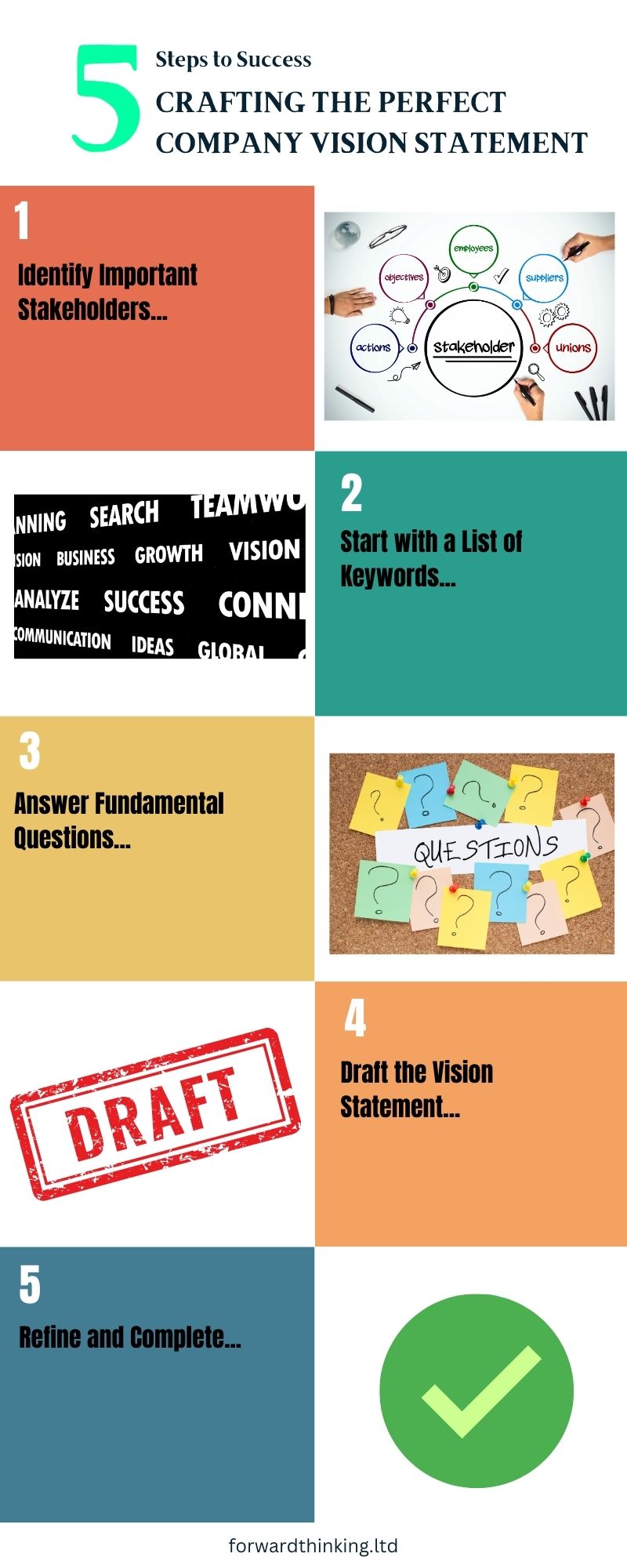
Crafting the Perfect Company Vision Statement: 5 Steps to Success

Introduction
Every successful business has a well-crafted vision statement that reflects its long-term goals and aspirations. A company’s vision statement embodies its purpose and mission. It acts as a strategic guide to shape its decisions and actions. But creating a perfect vision statement is easier said than done. It requires a thorough understanding of the company’s core values, culture, and stakeholders.
So, we’ve broken it down into the five essential steps to crafting the perfect company vision statement. From identifying critical stakeholders to refining and completing, we’ll give you practical advice on approaching each stage. Whether you’re a seasoned business owner or a new startup, this blog is for you. Let’s get into it.
Creating a Vision Statement
Step 1: Identify Important Stakeholders
Ask yourself the key stakeholders affected by your company’s success. These could be employees, investors, customers, suppliers, or even the wider community. By getting a clear understanding of the needs, wants, and expectations of these stakeholders, you can tailor your vision statement to resonate with them and gain their agreement.
Your senior leadership team should all be involved in this process, as they will have valuable input into the discussion. After all, your team lives and breathes your company’s vision every day, so get them involved at the start.
Step 2: Start with a List of Keywords
The next step is creating a list of keywords representing your company’s values, mission, and goals. These could include words such as innovation, collaboration, excellence, sustainability, and social responsibility. Once you have your list, brainstorm different ways to combine these keywords into potential vision statements. Use these as a starting point for further refinement.
Remember, there are no right or wrong answers at this stage, and it may surprise you what your company represents to different people.
Step 3: Answer Fundamental Questions
To ensure you ground your vision statement in reality, it’s essential to ask yourself some fundamental questions such as ‘What problem does our company solve?’, ‘Who do we serve?’ and ‘What are our chief strengths?’
From those, you can start weaving in your long-term goals. Where are you taking your business? What does success look like? How will you know when you’ve achieved it?
By answering these questions, you can create a statement that reflects your company’s unique strengths and qualities.
Step 4: Draft the Vision Statement
With your list of keywords and answered fundamental questions in hand, it’s time to draft your vision statement. It should include your bold and ambitious long-term goals and show how your company looks when you’ve achieved them.
Ultimately, your vision statement will be concise, memorable, and inspiring. But don’t worry about editing it yet. Getting all the points into one long paragraph is more important. Use language that is positive and future-focused. Consider incorporating your company’s unique selling points into the statement to differentiate it from competitors.
Step 5: Refine and Complete
The last step is to refine and complete your vision statement. This sounds simple enough, but don’t underestimate how long it will take!
Publish your long-form draft statement to the stakeholders and gather their feedback. You may need a couple of rounds of tweaking and editing before you finalise your vision statement. But it’s time well spent, as it will sit at the core of everything your company does for the next few years. So, don’t try to shortcut this part.
Once you have a final version, communicate it widely throughout your organisation and ensure everyone is aligned and committed to the company’s vision.
Summary
In conclusion, crafting the perfect company vision statement is a challenging yet rewarding process. It requires the involvement of all key stakeholders, a clear understanding of the company’s values, mission, and goals, and a thorough analysis of the fundamental questions that define your business. The steps outlined in this blog post provide a roadmap to follow.
But remember, creating a compelling vision statement is not an overnight task. It requires time, patience, and meticulous refinement. However, the result—a vision statement that drives strategic decisions, inspires your workforce and resonates with all stakeholders—is well worth the effort.
If you’re looking for support when planning out and implementing your company’s vision, Forward Thinking is here to help. Contact us to find out more.



